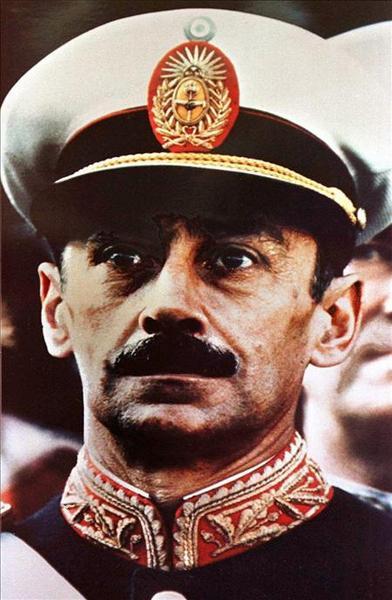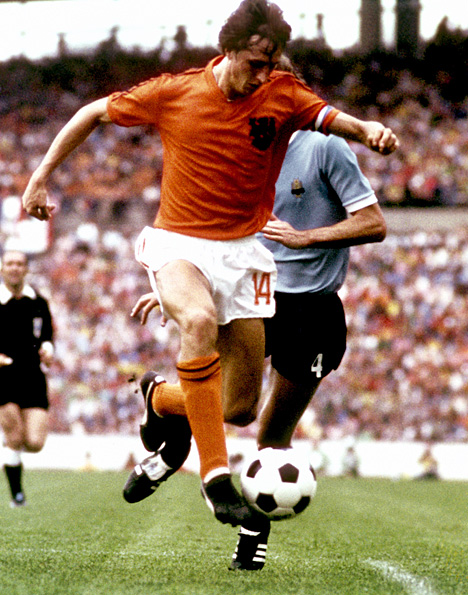Did Johan Cruyff Really Sit Out the 1978 FIFA World Cup as a Political Protest?
Here is the latest in a series of examinations into urban legends about baseball and whether they are true or false. Click here to view an archive of the soccer/football urban legends featured so far.
SOCCER/FOOTBALL URBAN LEGEND: Johan Cruyff sat out the 1978 FIFA World Cup as a political protest.
There is a long history of countries using international athletic competitions as political tools. Just during a four year stretch during the 1930s, you had Japan trying to send a delegation from their puppet nation, Manchukuo, to solidify that country’s status as a “real” country in the 1932 Olympics, then Benito Mussolini using the 1934 FIFA World Cup to show Italian superiority and Adolf Hitler using the 1936 Olympics to do the same for Germany.
More recently, the United States and the Soviet Union used the 1980 and 1984 Olympics, respectively, to make political points through boycotts.
So when Argentina was named as the site for the 1978 FIFA World Cup tournament, it was a major political coup for the new military leadership of the country, who had taken over Argentina in a Coup d’état in 1976. Jorge Rafael Videla was the nominal president of a military junta (or council) that ran the country and made several human rights violations between 1976 and 1983.

In 1978, while people likely did not know the extent of the problems in Argentina (thousands of dissenters went “missing” in those years), they did know that there were some serious human rights problems going on. So a number of countries made noise when Argentina was named as the host country of the World Cup. However much bluster there was, no country ended up actually boycotting the event, not even Netherlands, which was one of the more vocal countries about the Argentine leadership.
There WAS one notable absence, though – Netherlands’ star player, Johann Cruyff, perhaps the best European football player of the 1970s, and the leader of the Netherlands team.

Cruyff helped lead Netherlands to the finals of the 1974 FIFA World Cup (where they lost to host West Germany) and was thought by many to have been the best player in that particular tournament, even though his team ultimately did not win it all. Cruyff retired from international play in October of 1977 at the age of 31. The presumption for decades was that Cruyff was protesting the military dictatorship and human rights abuses in Argentina – we now know that this almost certainly not the case.
Cruyff was often outspoken about politics, so it was quite easy to believe that he was boycotting the games for the rumored reasons. To wit, when he was sold from the Dutch football team Ajax to the Spanish football team Barcelona in 1973 (for a staggering amount, equivalent to $2 million US dollars in 1973 money!), Cruyff made a comment about how he was pleased he was not sold to Real Madrid as he did not want to play for a team associated with the Spanish dictator General Francisco Franco.
However, the truth was a good deal more straightforward. Just a few years ago, Cruyff made international headlines when he revealed that he was actually kidnapped (well, held captive at riflepoint in his own home) in Barcelona 1977, soon before he retired! Kidnapping has become somewhat of an accepted terror in South America, but in the 1970s, it was actually more common in the RICHER nations of the world for kidnappings to happen (like the famous Patty Hearst kidnapping in the United States). Kruyff and his family were under armed guard for months following the incident. Naturally enough, you can certainly understand why Kruyff would not want to go off to Argentina (or anywhere, for that matter) in the wake of such an incident.
Interestingly enough, it appears as though Cruyff’s revelation came about due to his wish to debunk a DIFFERENT rumor about why he skipped the 1978 World Cup. You see, there were a good deal of rumors surrounding the 1974 Dutch team and sexual indiscretions (nothing proven, of course, and Cruyff certainly denies anything ever happened) and in a recent book, Cruyff’s former Barcelona teammate, Carles Rexach, asserted that it was Cruyff’s wife, Danny, who told Cruyff that he could not go to Argentina, as she could not handle being apart from him for a month (in the alternative, that she did not trust him on his own for a month). These rumors were highly popular in the Netherlands for decades, and Cruyff seemed willing to allow his wife to work somewhat as a scapegoat for decisions in his life, but it appears that his former friend’s book was the last straw, so Cruyff decided to finally admit his take on why he did not go to Argentina in 1978. In recent interviews about the event, Cruyff stated “To play a World Cup you have to be 200 per cent. There are moments when there are other values in life.”
Another rumor about why Cruyff skipped the World Cup had to do with sneaker endorsements (Cruyff had a contract with Puma while the Dutch national team was sponsored by Adidas).
I don’t think we’ll ever know for absolutely sure (although, really, the kidnapping angle sure seems to be a blatantly obvious reason to skip an international event, don’t you think? Especially as Cruyff and his family left Europe period in 1979 to go play for a professional soccer league in the United States), but the political reasons do not seem to have played any role in his decision.
His absence was made more dramatic when the Dutch team made it all the way to the Finals before falling to the team from the host country, Argentina.
Thanks so much to Dutch football expert Ernst Bouwes for his expertise on collecting all the various rumors about the 1978 World Cup.
The legend is…
STATUS: I’m Going With False
Feel free (heck, I implore you!) to write in with your suggestions for future urban legends columns! My e-mail address is bcronin@legendsrevealed.com





